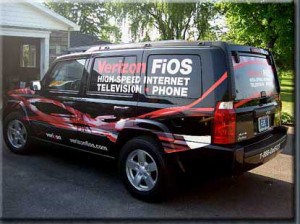When a company like Comcast grows so big, it no longer cares whether its marketing claims are true or false, perhaps it is time to put those claims to the test in court or before a state attorney general for review.
Recently, Comcast’s claim it runs the fastest Internet Service Provider in the nation came under scrutiny by the Better Business Bureau. The simple truth is, Comcast is not the fastest ISP in the nation — not even close. But because PC Magazine ran a limited test of some national broadband providers and found Comcast barely making it to the top, the cable giant has been running ads across the country that are disingenuous and incomplete at best, completely misleading and false at worst.

Phillip “Comcast is not too big to deserve a FAIL“ Dampier
The National Advertising Division of the BBB, a self-regulating industry-controlled body, found the advertising deceptive, which says a lot for a group that lives or dies on the whims of the industries that support its operations.
NAD previously determined that Comcast cannot, based on its current offerings, make an unqualified claim in national advertising to be faster than the competition. NAD noted that while Comcast is the fastest Internet option for 94 percent of the 52 million households in its competitive footprint, it is not the fastest where Verizon FiOS is available.
Consumers need deep pockets to read the actual report that mildly criticizes Comcast. The NAD keeps the public out of its business with a subscription rate of $550 a year to read detailed individual case reports. We learned about the case from one of our readers who shared a copy.
Among the false claims Comcast is still making:
- “It’s official. We’re the fastest.” — Officially, Comcast is not the fastest.
- “…the fastest downloads available.” — False.
- “FiOS Does Not Live up to Expectations….With Speeds of Up to 105Mbps, XFINITY was rated as the fastest Internet provider in the nation by PC Magazine.” — But FiOS speeds are faster than Comcast. PC Magazine did not test Verizon FiOS.
 Comcast agreed to consider making changes to their advertising to comply, but that now appears to be a non-starter.
Comcast agreed to consider making changes to their advertising to comply, but that now appears to be a non-starter.
In Chattanooga, Tenn., EPB Fiber broadband beats the pants off Comcast. No, it’s actually worse than that. EPB embarrasses Comcast’s comparatively slow broadband service. While Comcast was looking for a way to manipulate customers into using its Xbox online video app to avoid their unjustified usage cap, EPB customers were bypassing that problem altogether by choosing EPB’s fiber to the home service that doesn’t have usage caps and delivers speeds up to 1Gbps. Comcast, (remember they are “America’s fastest”) tops out at 105Mbps.
One would think Comcast would be hurrying their blatantly false advertising off the air and out of sight in Chattanooga, but the company has refused.
The Times Free Press reports Comcast won’t be making any changes to their ads, and has actually doubled-down with more blatantly false marketing claims. Why? Because EPB is too small of a player for Comcast to be concerned with telling the truth:
Jim Weigert, vice president and general manager of Comcast in Chattanooga, said the request won’t apply to this area and advertising will stay the same.
“I don’t see any changes at all,” he said. “Our use of that designation as the fastest ISP and fastest commercial ISP is still the same and will still be used the same as it is today.”
Weigert said local networks such as EPB, which delivers maximum download speeds about 10 times faster than those of Comcast, is too small of a player to affect the region’s advertising or PC Magazine‘s designation.
“Those awards exist, and we just need to make sure we’re using it properly and quoting it properly,” he said. “It doesn’t reference EPB at all because they’re not national. They’re not big enough to get that attention.”
In other words, actual facts about broadband speed don’t matter. With standards like this, it is only a matter of time before we’ll be seeing program length commercials for snake oil.
Beyond the fact Comcast is morally and ethically wrong here, I’m not sure I would want my company admitting to customers truth should come in second. With that kind of attitude, Comcast customers should put their wallets in their front pockets, leave the kids home and lock their car doors before visiting a Comcast Cable Store.
Deborah Dwyer, public relations supervisor for EPB, notes the Comcast ads are self-serving and “cause pretty significant confusion among the public.”
At least the public that still believes what Comcast Cable tells them represents the truth.
 Verizon customers can expect to pay more for the company’s fiber to the home service, FiOS, even as promised higher speeds arrive.
Verizon customers can expect to pay more for the company’s fiber to the home service, FiOS, even as promised higher speeds arrive.

 Subscribe
Subscribe




